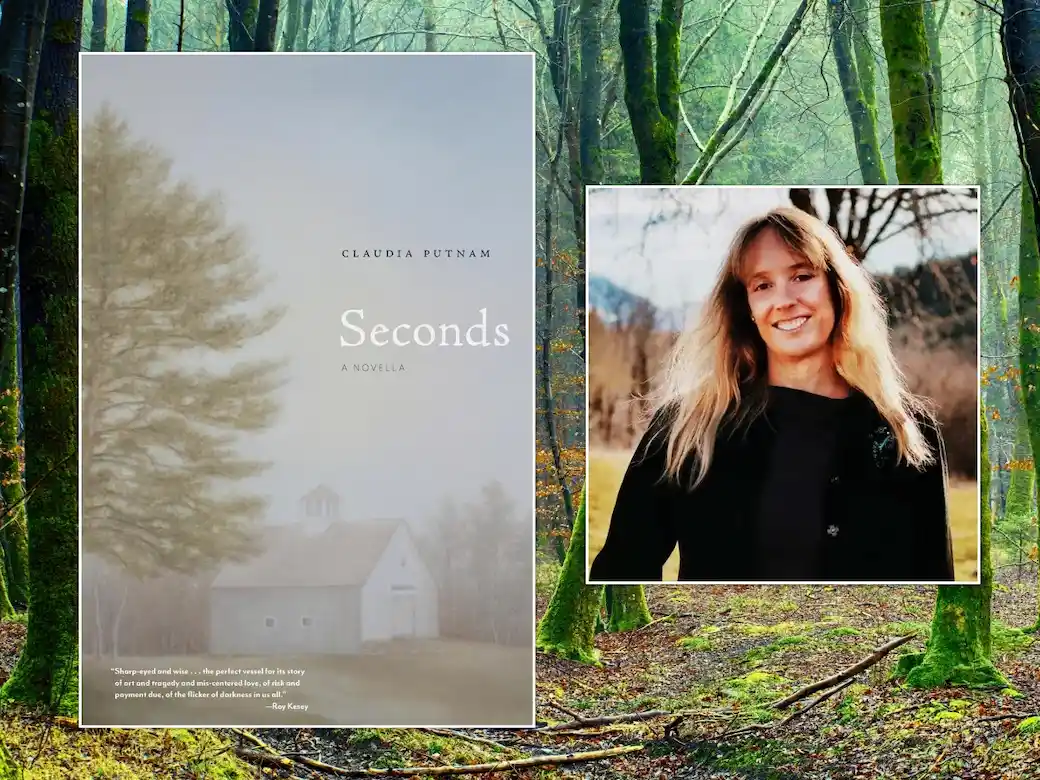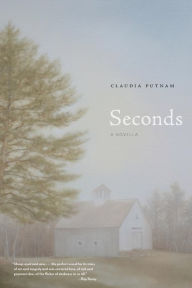“Seconds” – Have we misunderstood the very nature of good and evil?
In This LitStack Review of Seconds
Seconds, A Short Novel Packed With Insight And Feeling
In the first sentence of Seconds, Claudia Putnam’s superb new novella, we encounter at least one of the meanings of the title: “We weathered some heavy rain, small hailstones, on our way to visit my old friend John Perkins and his second wife.” We also encounter the powerful, silent presence of the land and weather of New Hampshire.
Ethan: A Compelling Narrator
By the end of the first page, we’ve gotten to know the voice of Ethan, the narrator, and we know his class pretty exactly: he drives “a luxury performance car, … better than your average Camry” even though “it was no Porsche.”
We also know that jealousy and competition are near the heart of the story, as Ethan’s friend John has in fact owned a Porsche. We know Ethan is materialistic enough to be rather obsessed with cars, but also self-aware enough to know that “I’m not really talking about cars”—and interesting enough to keep us listening to him from the first page to the last.
One key to the novella’s success is the balance Putnam achieves in the narrator’s voice. Ethan keeps the story moving and keeps the reader in suspense, wanting to know what will happen, while also spinning out original and surprising thoughts that reveal his character and others’. In talking about his second wife Tina’s concern that he might have had an affair with his friend’s ex-wife, Ethan reflects on Jimmy Carter’s famous confession about having lust in his heart:
The lust in his heart wasn’t anything along the lines of “here she comes just a-walking down the street.” It wasn’t some coworker he sweated over for six months. It wasn’t one of those movies we’re automatically loading as we go about the day: the receptionist, the cashier, the buddy’s wife, even the son’s girlfriend. Beautiful, ordinary, thick, thin, young, old. Even Meryl Streep if that’s the movie I’m watching. Bent over the furniture. What was in Carter’s heart had to be something dark.
Anna, The First Wife: The Haunted, Haunting Artist
Perhaps most importantly, we soon learn of “John’s first wife, the painter Anna Halloran,” whose paintings still fill the rooms of the home John shares with his second wife, Penny. Soon the novel takes us back to the time when John and Anna were married, and introduces the other key characters, Rusty and Suzy Chappell and their troubled, threatening son Felix, who somehow has become the sheriff of their community despite coming from “a thug family” and apparently fitting right into it.
After Anna has an accident and this sheriff takes her to the hospital, the specter of violence never dissipates. As the novel progresses, it becomes a profound reflection on the potential for violence in all of us—or at least all men. The narrator says:
Maybe it wasn’t two percent of the population who were sociopaths. Maybe it was 2 percent in most of us. … I was having an experience, a moment of wonder, where you think, how is that even possible, that someone could be so free, that they could just take what they want, without even stopping to feel another person’s pain.
While Ethan (the narrator) comes from a very different world than Felix (the sheriff), he comes to realize how they may be similar in disturbing and all-too-human ways.


John: A “Nice Guy”
In fact most of the characters in Seconds are all too human. There’s no one who is exactly likable, let alone lovable. These are complex human beings who (mostly) have some redeeming qualities. Our points of view on various characters evolve throughout the book as the characters’ points of view on each other evolve.
Near the beginning of the book, the narrator says about his friend John Perkins, “John especially loved to bail out otherwise brilliant friends who had gone and done stupid things. This meant, we all believed, that he was a nice guy.” It would be hard to think of a more ominous phrase than that “we all believed.”
Art: More Than Pretty Scenes
One theme of Seconds that hovers quietly in the background is the role of art in people’s lives. Anna, after all, is a serious artist. A related theme in the foreground is Ethan’s regret that he had not been more assertive in showing his interest in Anna, perhaps winning her away from John, who took her for granted. Ethan realizes John’s attitude when he talks to John about his concern that country life is not nourishing Anna’s art:
“Come on, John. Being away from all her connections, the galleries, the big critics? Her work needs an edge if she’s going to find a way back in. If she’s not going to be just another painter with a booth full of pretty scenes at the Craftsman’s Fair.”
He looked at me in the dim forest light, then took another hit. “Oh,” he said. A surprised sort of oh. Then, “huh.” I guessed that he had indeed pictured her showing her work at the Fair. He would have been proud. If she had her paintings hanging in one of the banks over in Lansing.
The Shifting Meanings of Good and Evil
Putnam vividly captures the distinctions between the characters’ world views, and how each is limited by their particular viewpoint. Ethan is an attorney for investment firms (“I don’t risk anything of my own”). He can discuss business with John and art with Anna, but perhaps in neither case with the depth of someone who actually is risking something crucial, whether for business or for art.
The one person who seems to have no one to talk to (and not to care) is Felix, the sheriff, who is the closest to an actual villain in the novella. What he does understand is horses, and that’s where he shows the compassion that he does not seem to feel for human beings. Anna paints horses but doesn’t ride them, and the sometimes violent Felix is the one who notices that one of her horses is troubled and needs a companion. The “horse whisperer” side of Felix is another example of the novel exploring the complexities of human nature and our understanding of who’s good and who’s evil.
Seconds packs more insight and feeling into its short length than many full-length novels, exploring how close to the surface violence may be in even the most civilized of us, the most thoughtful. This masterful book makes us wonder what others are capable of, what we might be capable of ourselves, and whether we may have misunderstood the very nature of good and evil.
~ Robert Thomas
About Claudia Putnam, Author of Seconds
Claudia Putnam grew up in New England and lives now in western Colorado-with two manic huskies and an angry cat. Her fiction can be found in Confrontation, Cimarron Review, phoebe, Variant Literature, and elsewhere. A short memoir, Double Negative, won the Split/Lip Press creative nonfiction chapbook prize. Her debut collection, The Land of Stone and River, won the Moon City Press poetry prize. She is the recipient of several residency awards, including the George Bennett Fellowship at Phillips Exeter Academy.
You can find and follow Claudia Putnam on her website.
Other Titles by Claudia Putnam

About the Reviewer, Robert Thomas
Robert Thomas’s most recent book is Sonnets with Two Torches and One Cliff. His first book, Door to Door, was selected by Yusef Komunyakaa for the Poets Out Loud Prize. His novella Bridge was published by BOA Editions and received the PEN Center USA Fiction Award. He has received an NEA fellowship and a Pushcart Prize, and lives in Oakland, California.
You can find and follow Robert Thomas on his website.
Titles by Robert Thomas

Other LitStack Resources
Be sure and look at our other LitStack Reviews for books you should read, as well as these reviews by Lauren Alwan, and these reviews by Sharon Browning.
Comment
Be sure and leave a comment if you like.
As a Bookshop, Malaprop’s, BAM, Barnes & Noble, Audiobooks.com, Amazon, and Envato affiliate, LitStack may earn a commission at no cost to you when you purchase products through our affiliate links.
You can find and buy the books we recommend at the LitStack Bookshop on our list of LitStack Recs.






